
EIIP Lebanon update June 2025
Background
Since the announcement of the cessation of hostilities on 27 November, Lebanon has seen a massive movement of internally displaced returning to their communities of origin amid a complex humanitarian situation. Many families returning closer to their areas of origin are confronted with destroyed homes, devastated infrastructure, disrupted essential services and lack of safety and security. In many cases, returning families remain internally displaced as their homes have been destroyed or damaged, but they have moved closer to their homes and/or within their communities. Ongoing insecurity, unexploded ordinance (UXO) risk and access restrictions, including Israeli Army warning against returns to over 70 localities in southern Lebanon, pose additional challenges for affected populations returning to their areas of origin.
The conflict has claimed more than 4,000 lives, including children and women, with around 17,000 injured since 8 October 2023. More than 50 people have been killed in Israeli attacks since the cessation of hostilities, according to MoPH, with strikes continuing to affect parts of the South, Nabatiyeh, Bekaa, and Baalbek-Hermel governorates.
All this has further exacerbated the economic crisis in Lebanon which in turn has led to high levels of internal migration, inflation, sharp price increases, job loss and increasing vulnerabilities and protection risks for the most vulnerable sections of the population, such as daily workers, elderly, women, and men living in poverty, female headed households, and people with disabilities, although the beginning of 2025 has provided some level of hope to the locals with the election of a president and the appointment of a prime minister.
EIIP therefore remains an important crisis response approach, to strengthen the resilience of vulnerable local host communities and Syrian refugees by providing job opportunities and improving livelihoods, contributing to economic development, service provision, and crisis response.
EIIP Lebanon and KfW signed on the financial agreement for Phase V starting January 1st, 2023, for a duration of 25 months. A no cost extension till April 30, 2025, was approved by KfW to cover the delays in implementation of projects originated due the Israeli conflict and another extension to that till August 2025 was recently granted. Phase V initially covered both the creation and rehabilitation of public assets with more focus on the generation of green works and capacity building as well as skills development both for concerned public institutions (such as relevant Ministries, beneficiary municipalities and other governmental entities) and direct beneficiaries of the program, i.e., workers. Projects were identified in coordination with KfW and initial employment targets specified. Currently, most of these projects are ongoing with many already completed and delivered to the respective project owners; details of which can be found in the table below.
Furthermore, some of the projects that were in high-risk areas were suspended and some of their funds repurposed for the purpose of Lebanon emergency response through which EIIP carried out rehabilitation work in a select number of collective shelters spread throughout the country.
Phase V interventions were planned to be implemented in all 7 Governorates (Akkar, North, Baalbeck-el Hermel, Bekaa, Mount Lebanon, Nabatieh, and South). 21 interventions were initially determined and estimated to generate around 320,733 worker-days, resulting in 5,613 jobs, targeting 50% of Syrian and 50% of Lebanese workers. Women participation targets for this phase are augmented to 30% (in comparison with 15% for phase IV) while the PWD participation will be targeted at 4% (in comparison with 2% for phase IV).
EIIP Phase VI agreement has also been signed between EIIP Lebanon and KfW for a period covering 4 December 2024 till 3 May 2027, for a budget of $9,955,299.33.
Phase VI portfolio will continue to focus on infrastructure support for Just Transition and Green Works, including the agricultural roads and support for agricultural productivity yet also continue the rehabilitation and repair of the built environment as in previous phases, such as road repair and maintenance, sidewalks, and municipal buildings. A consultant was commissioned early in 2025 to execute the project identification process following a structured, three-phase approach to ensure a transparent, evidence-based, and participatory selection process. Municipalities shortlisted based on vulnerability criteria, and identified projects were assessed based on technical feasibility, economic viability, social impact, and long-term sustainability beyond the EIIP intervention. A long list of the selected projects along with the detailed report of the identification was shared with KfW that provided relevant comments that were taken into consideration for the following short list, which was recently granted a no objection by KfW.
In terms of capacity building under both phases, a training session is scheduled on the 17th of July targeting local government beneficiaries of phase V and phase VI, during which topics such as decent work, local resource-based technology, and EIP guidelines will be covered. Furthermore, a new ToR under phase VIfor the update of the EIIP guidelines has been launched, through which the consultant is required to carry out few workshops with all stakeholders including partner UN agencies, National partners and social constituents. These workshops will help both in identifying gaps and needs in terms of institutional knowledge and thus tailoring the capacity building materials for each partner. Phase VI will therefore focus more on enhancing our capacity-building portfolio to work towards institutional strengthening in terms of EIP guidelines and ESS standards.
Phase V projects
Municipal infrastructure
This component included 3 projects in North Lebanon, 2 in the South, 3 in Mount Lebanon and 5 in Bekaa. All projects under this component have already been completed. However, three were initially suspended due to the aggression of the Israeli attacks in those areas; located in Abbasiyet Sour, Hermel, and Burj al Barajneh. The project in Hermel is being reconsidered currently however the previous contractor rejected to resume work therefore the project will be retendered in Phase VI. As for Abbasiyet Sour and Burj al Barajneh, they have now been assigned under phase VI projects.
Routine Road Maintenance and Spot Improvement
The EIIP road maintenance strategy combines simple routine maintenance such as clearing of drains and vegetation control with spot improvements such as repair and construction of lined drains, retaining walls, concrete crushed barriers, and traffic safety measures...etc. Seven projects were determined for this phase, six of which have already been completed, and one was suspended due to the war (Burj Rahhal- Qabrikha road); however, work has resumed in this area due to high demand from locals and the municipality in addition to the current condition caused by the sudden stoppage of work due to the escalation of hostilities. The activities, however, are limited to the damaged area caused by the construction of the Gabion wall. The same contractor, ICC, has been awarded a new contract at a total amount to resume the work in activities that have already started before the work cessation.
Agricultural infrastructure in coordination with MoA/ Green Plan (‘Greening the Lands’ component)
Since 2021, the ILO and the Green Plan have been collaborating to support 800 farmers across all eight governorates of Lebanon in Phase IV, in the "Employment creation and enhanced agriculture productivity through construction and rehabilitation of farm infrastructure" project out of which EIIP managed to cover 683 farmers due to cancellation of farms located at the borders in the South of Lebanon in October 2023 at the beginning of the war.
Phase V: The call for applications from farmers was launched by the Ministry of Agriculture for a period of 1.5 months which ended by Sep 2023, and subsequently 840 farms were selected for the EIIP intervention. Under this component, EIIP has partnered with two projects within the ILO (PROSPECTS and ENABLE) to further increase the number of farmers supported to 1,182 in Total out of which EIIP is covering 840.
273 farms, however, were cancelled from the Southern area due to the escalation of the conflict, the total amounting to $1.2M out of which $800K has been repurposed under LRI agreement for the crisis Response (namely RELIEF). The cancelled farms in the South are now re-activated and contracts signed with the pre-selected contractors to resume works. Meanwhile LRI are revisiting farmers to validate their requests, Variation Orders might be considered to replace farmers, these lots are covered from Phase V except for Batch 3 Lot 14 Rachaya/West Bekaa Lot has been rephased to Phase VI due to the fact that the majority of funds that were allocated for GP activities were shifted to the emergency response. Furthermore, the total amount shifted from Phase IV to Phase V has been injected into GP lots due to the deficit created by the emergency response during the war, mainly the intervention in Tripoli, Btater and Dekwaneh (see below section on emergency response) which amount to almost $160K, equivalent to the shifted amount from Phase IV excl. PSC. The shifted balance of $160K excl.VAT will ensure the generation of a total number of 3,200 WDs under GP Project and an estimate number of 56 jobs within the overall targets of phase V.
The Response for Environmental Livelihoods and Employment Funding project (RELIEF) was introduced to improve the livelihoods and living conditions in rural areas through Cash for Work environmental activities in 36 villages distributed across North 1, Mount Lebanon, North Bekaa, West-South Bekaa, Rashaya and South of Lebanon. In fact, it was initially designed as IDP support, however it was transformed to CFW upon the ceasefire agreement. The cash for work here includes in addition to roadside clearing, environmental activities aimed at forest fire mitigation (i.e. fuel reduction), trimming, and reforestation. Furthermore, roadside cleaning and fuel reduction involve the removal of all potential fire hazards that could be due to irresponsible behavior i.e. dry debris or resinous plants catching fire from a cigarette, etc. The work is identified based on the fire risk and its potential expansion. It also includes the pruning of low branches of trees as applicable based on environmental and national standards. The sections are not necessarily limited to roadside activities. On the other hand, town cleaning and routine road maintenance aim essentially to enhance road safety, by removing obstacles, unblocking drainage systems, and enhancing visibility. RELIEF project has been recently completed.
Another project was also implemented together with LRI related to labour intensive forestry activities in Akkar, North and Bekaa regions. Due to the war, activities in Bekaa and North Bekaa were replaced with IDP support. This intervention has now been completed. LIFA project has been recently completed.
Emergency Response
Under the emergency response three collective shelters were targeted through minor rehabilitation works with the longer-term impact of supporting the said educational centers when they re-open their doors to students. To date, these activities have generated employment for a total of 173 beneficiaries, 29% of whom are women, for a total of 3,652 worker days.
More details on the Phase V projects can be found in the table below.
A live project map can be found on the following link: EIIP Lebanon Projects Map
EIIP Phase V
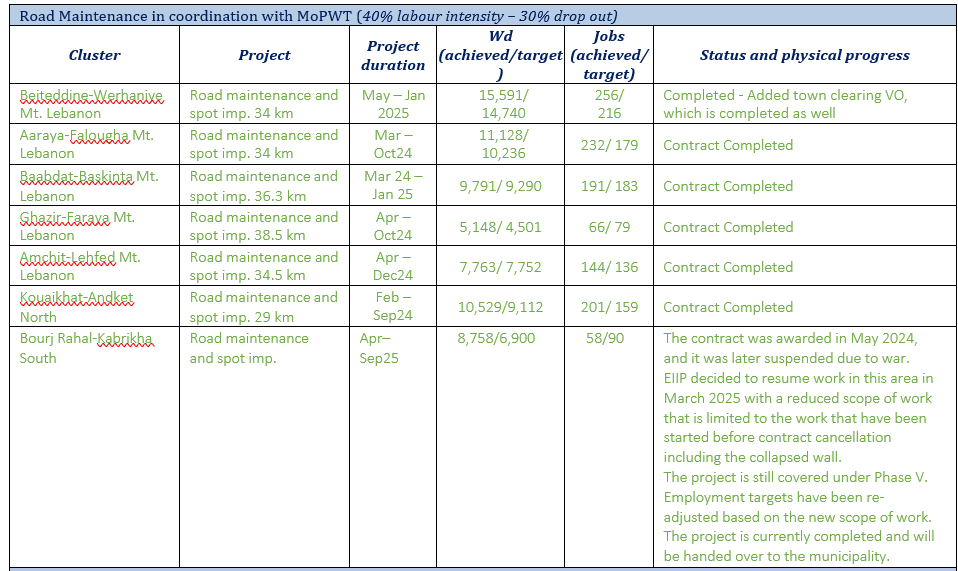

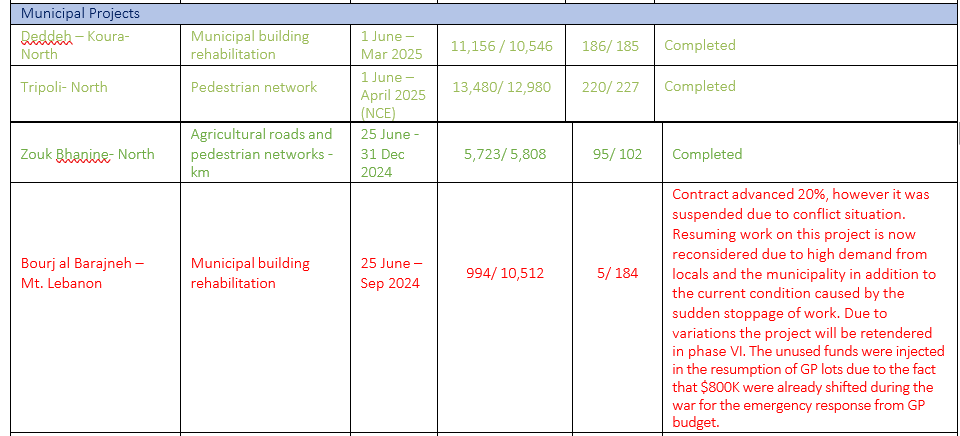
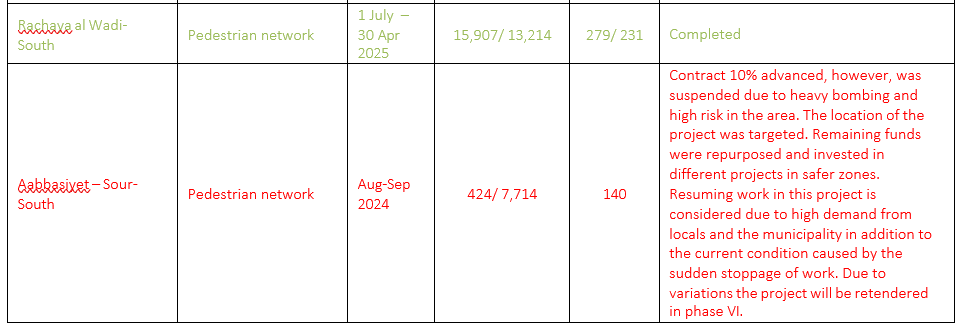

Employment generation summary June 2025
Overall EIIP employment figures as of June 2025
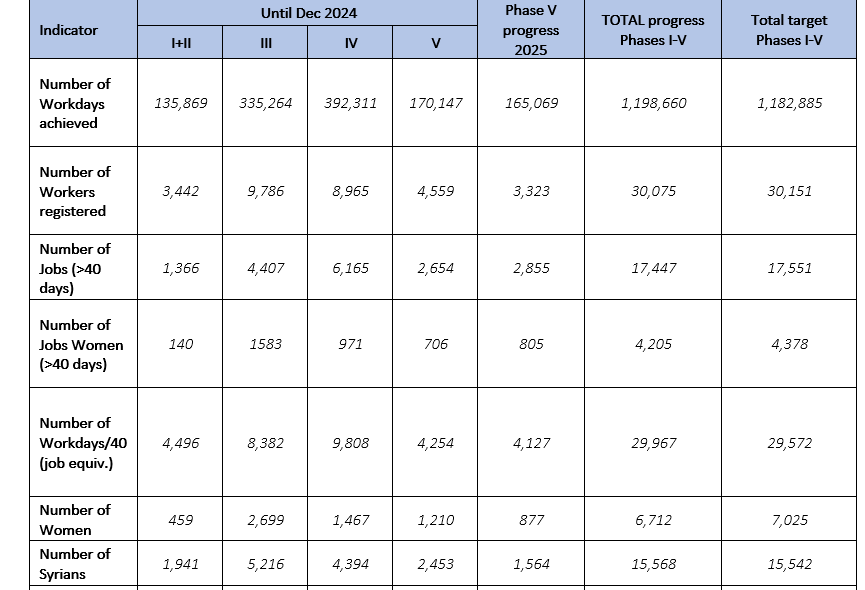

Phase V EIIP employment figures
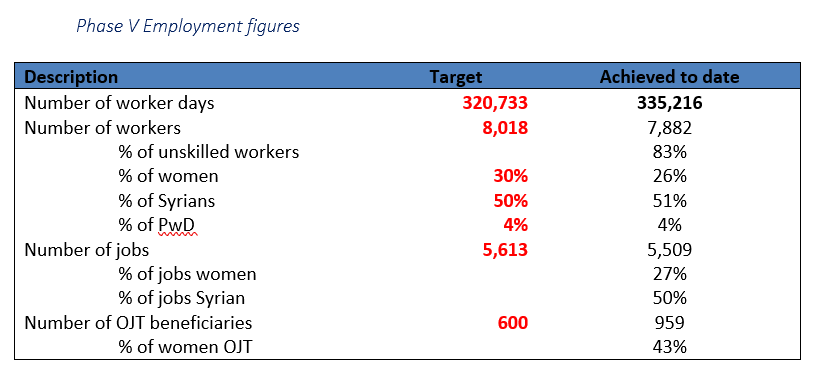




.svg)